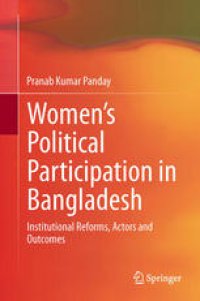
Ebook: Women’s Political Participation in Bangladesh: Institutional Reforms, Actors and Outcomes
Author: Pranab Kumar Panday (auth.)
- Tags: Gender Studies, Public Administration, Political Science general, Sociology general
- Year: 2013
- Publisher: Springer India
- Edition: 1
- Language: English
- pdf
This volume offers an understanding of institutional reforms, gender-related policy dynamics, the role of different actors in the policy process, and the impact of a particular policy on the state of women’s political participation in Bangladesh. The discussion is set against the background of the Fourth World Conference on Women, 1995, in Beijing, in which a Platform for Action signed by heads of governments expressed their countries’ commitment to achieve ‘gender equality and empowerment of women’ through ensuring integration of the gender perspective at all levels. In Bangladesh, notable among the initiatives undertaken was the enactment of the Local Government (Union Parishads) (Second Amendment) of 1997, through which one-third of seats were reserved for women in the Union Parishad (UP) and the system of direct election was introduced to elect women members in reserved seats. The Act of 1997 is considered to be a milestone, since it has enhanced women’s participation in the local government politics significantly. Against this background, the specific research questions that have been addressed in this volume include: the necessity of reform for enhancing women’s participation in politics; the context against which the Government of Bangladesh enacted the Act and the reasons such an initiative was not taken earlier; the actors behind the reforms and their role in the reform process; and the impact of the reform on the state of women’s participation at the local level in Bangladesh.
This volume offers an understanding of institutional reforms, gender-related policy dynamics, the role of different actors in the policy process, and the impact of a particular policy on the state of women’s political participation in Bangladesh. The discussion is set against the background of the Fourth World Conference on Women, 1995, in Beijing, in which a Platform for Action signed by heads of governments expressed their countries’ commitment to achieve ‘gender equality and empowerment of women’ through ensuring integration of the gender perspective at all levels. In Bangladesh, notable among the initiatives undertaken was the enactment of the Local Government (Union Parishads) (Second Amendment) of 1997, through which one-third of seats were reserved for women in the Union Parishad (UP) and the system of direct election was introduced to elect women members in reserved seats. The Act of 1997 is considered to be a milestone, since it has enhanced women’s participation in the local government politics significantly. Against this background, the specific research questions that have been addressed in this volume include: the necessity of reform for enhancing women’s participation in politics; the context against which the Government of Bangladesh enacted the Act and the reasons such an initiative was not taken earlier; the actors behind the reforms and their role in the reform process; and the impact of the reform on the state of women’s participation at the local level in Bangladesh.